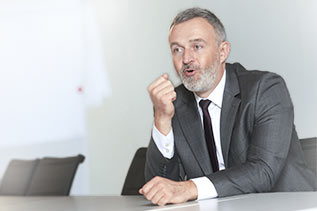Interview with Head of Sustainability Management
Interview with Dr. Holger Hoppe, Head of Sustainability Management at KION Group, on the Company’s mission and objectives in establishing a Group-wide sustainability management system

Dr. Holger Hoppe
Head of Sustainability Management at KION Group
Dr. Hoppe, KION has set its sights high regarding sustainability. What makes you so confident that you can implement your strategy?
Dr. Hoppe: We have a long tradition of structuring our business activities in line with sustainability principles. In light of this, we recently launched a Group-wide sustainability management system to systematically develop our Company's sustainable focus further. This began with the formulation of our sustainability strategy, the definition of the corresponding action fields, the derivation of initial objectives and benchmarks, and continued right, through to the appointment of people responsible for each action field. Our Company’s expertise and values provided an excellent starting point.
The speed and manner in which we implemented these steps fill me with confidence. After all, both of these show that sustainability is already firmly embedded in our Company – that is, in the minds of our employees, who are clearly willing to take responsibility in their work. This starts with the Executive Board, which is responsible for the sustainability strategy and sets transparent objectives, and continues via the managers right down to every individual in the Company.
What are these contributions, specifically? What can the individual achieve?
Dr. Hoppe: It is especially important to integrate sustainability at all levels directly into our business processes. To achieve this, we need leaders who are responsible for these processes. We give them the necessary structures and tools to be able to take sustainability aspects into account in their decisions. We also want to raise the awareness of each individual employee of the overall topic area. After all, the individual can often achieve a great deal! Take the topic of occupational health and safety, for example. Here, Linde Material Handling has established a fundamental measure – the Linde Safety Contact, which precedes every meeting. As part of this, participants can address safety aspects that they notice – from the unchecked ladder in their work area, through to positive experiences on work safety which are worth replicating. The high level of acceptance shows that employees consider this measure to be effective. This is just one of many examples of how sustainability – in this case the topic of safety – originates from the individual employee and has a positive impact. The suggestion scheme also plays an important role here too, as good ideas are usually also ideas that move us forward in terms of sustainability.
What role do the operating units play in your work?
Dr. Hoppe: KION is a young company – but our brands have enjoyed market success for almost 100 years in some cases. In terms of sustainability too, our operating units are already ahead of the Group in many respects. For example, we have already established a sustainability management system at Linde Material Handling EMEA in recent years. Ultimately, sustainability management is about fulfilling our own requirements and considering those of our stakeholders. On the side of the KION Group this includes, for example, our shareholders, our employees in all units, and at our operating units naturally our customers too. We aim to generate added value right across all our business activities.
Linde Material Handling has already reported on this since 2015 in its own sustainability report...
Dr. Hoppe: That’s right. This is a pilot project, if you will. We are now harnessing the benefit of these experiences at KION. This is a further reason why we have already achieved a lot in such a short space of time. And Linde Material Handling is not alone. At STILL and our other operating units too, numerous measures are currently running worldwide, which are moving us forward at both a brand and Group level. It is now important to establish uniform standards across the Group to manage our sustainability activities systematically. At the same time, our operating units can implement individual measures, such as to provide targeted support to their customers.
With Dematic joining the family KION has started a new chapter in its history, and has become a full-service supplier of intralogistics solutions for its customers. What does this mean for the sustainability management of the KION Group?
Dr. Hoppe: Firstly, as in all other areas, it is also important to involve Dematic in our activities. Together we are stronger – so we want to drive forward our activities in close collaboration right from the very outset, including in terms of sustainability. Dematic is another important brand in our portfolio – and I’m confident that our colleagues there will provide a many important stimuli.
What do you want KION to have achieved in terms of sustainability with presence of the next report?
Dr. Hoppe: Firstly I am delighted that we are already beginning to create transparency on our activities with this current report. As a Group, we are only at the start of our journey with our sustainability management system. But I believe that it is clear just how seriously we take our commitment to greater sustainability. And if the publication of the next report is due soon owing to EU reporting obligations, we already intend to provide firm evidence of our aspirations in our next report – with the deepening and broadening of our sustainability programme, and reporting on the achievement of our initial targets.